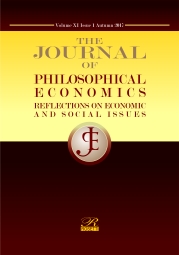Six choice metaphors and their social implications
Six choice metaphors and their social implications
Author(s): Frederic B. Jennings Jr.Subject(s): Philosophy, Social Sciences, Economy, Special Branches of Philosophy, Sociology, Philosophy of Science, Social Theory, Socio-Economic Research
Published by: Editura Rosetti International
Keywords: metaphors; complementarity; planning horizons; cooperation; systems theory;
Summary/Abstract: The six metaphors analyzed in this paper unfold stepwise into an interdisciplinary systems framework based on planning horizons. The notion of planning horizons serves as an ordinal measure of rationality and organization, in a social systemic context of ecological interdependence. Each metaphor opens into the next to extend our understanding.The neighborhood store is where almost all neoclassical choices are made, with visible options spread on shelves and a budget allocated among them, maximizing its worth. The chessboard demands strategic contingency planning in an evolving context of incompletely projectable outcomes. A transportation network combines substitutes and complements into a static complex system, intertwined and nondecomposable, leaving economists with a problem of institutional choice. Love is a complementary good – virtually costless to produce and distribute, always in demand – that should be abundant, though it is scarce. The educational system brings interhorizonal complementarities into our field of view, where contagion effects of longer horizons enhance complementarity at the expense of substitution, shifting the mix of interdependence away from conflicts to concerts of interest. Human ecology is a dynamic complex system of interactive phenomena opening into time, evolving constantly in its structure, relationships and diversity and demanding ethics in our relations. These six metaphors raise some pressing questions on the invisible limits of models standing on substitution applied where they have no place. Symptoms of failure reveal themselves in myopia, ecological loss and the rise of violence in society. Economic implications of these metaphors are reviewed to illustrate the basis for an interdisciplinary approach to social scientific constructions.
Journal: Journal of Philosophical Economics
- Issue Year: II/2009
- Issue No: 2
- Page Range: 34-77
- Page Count: 44
- Language: English

